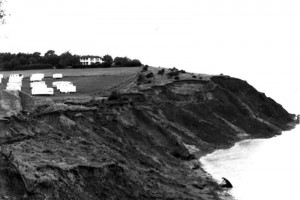At the eastern end of the Isle of Sheppey in Kent are the remains of another sound mirror. It was once on top of the cliffs, but erosion of the soft clay has left it in pieces on the beach.
![[Photo of Warden Point acoustic mirror remains, 8 October 2005]](/images/mirror/warden-002.jpg)
The design is similar to the mirrors at Selsey and in the northeast, suggesting a First World War date for its construction.
The mirror seems to have been built from concrere “layers”, which have separated on the beach. The surface of the dish has the remains of a coating roughly two inches (50 mm) thick, perhaps to give a smoother surface?
![[Photo of mirror before it collapsed]](/images/mirror/warden-aerial.jpg)
The mirror in its original cliff-top location c.1964. It fell over the edge about 1978-79.
Photo:Paul Prior

Paul Prior has supplied this old photograph, possibly taken circa 1969-70, showing the sound mirror before the cliffs were eroded so far that the it fell onto the beach below. The mirror is on the extreme left of the picture.
![[Photo of Warden Point sound mirror remains]](/images/mirror/warden2.jpg)
Photo: Carol Hunt went when the tide was out
![[Photo of Warden Point sound mirror remains]](/images/mirror/warden-049-small.jpg)
Erosion continues. 8 October 2005.
![[Photo of Warden Point sound mirror remains 8 October 2005.]](/images/mirror/warden-029-small.jpg)
The surface of the dish has a coating applied to the main concrete construction.
![[Photo of Warden Point sound mirror remains]](/images/mirror/warden-059-small.jpg)
Warden Point and the remains of the mirror. 8 October 2005.
![[Photo of Warden Point sound mirror remains]](/images/mirror/warden5-small.jpg)
Looking towards Leysdown. Photo: Bruno Brunning, 2003
![[Photo of rubble and rubbish on beach]](/images/mirror/warden-038-small.jpg)
Among the lumps of concrete (and bricks, old bikes, a lawn mower and other assorted flotsam and jetsam) surrounding the mirror is a slab which helpfully says “Cracked” on it. It’s anyone’s guess why.
8 October 2005.
Location
![[How to find the mirror, 8 October 2005]](/images/mirror/warden-066.jpg)
The ruins of the mirror are on the beach just south of Warden Point, near Leysdown on the Isle of Sheppey. It is easy to find, a short walk from the road at Warden.
![[Sign warning - Danger. Cliff erosion and unstable soil]](/images/mirror/warden-notice.jpg)
From the car park on the optimistically-named Imperial Drive there is a ramp down to the beach. Go down, then simply walk north along the foreshore for a short distance past a few groins. You can’t really miss the mirror (seeing as it is a heap of large concrete blocks!). An approximate grid reference is TR021721. It might be worth checking the tide times, as the water comes up around it.
There are buses between Shearness and Leysdown which turn off the main road to call in at Warden, though when I went the timetables didn’t mention this so I needlessly walked from the main road. This being Britain, there was no timetable for the hourly service at the bus stop.
Links
- Sound Mirror & Fortifications at Warden’s Bay, Sheppey by Carol Hunt
- SouthEast Defence Photos has a photo of the sound mirror at the base of the cliff in 1978.
![[Photo of Warden Point sound mirror remains]](/images/mirror/warden-001.jpg)
![[Photo of Warden Point sound mirror remains]](/images/mirror/warden-006-small.jpg)
![[Photo of Warden Point sound mirror remains]](/images/mirror/warden-042-small.jpg)
![[Photo of Warden Point sound mirror remains]](/images/mirror/warden1-small.jpg)
![[Photo of Warden Point sound mirror remains]](/images/mirror/warden7-small.jpg)
![[Photo of Warden Point sound mirror remains]](/images/mirror/warden6-small.jpg)
![[Photo of Warden Point sound mirror remains]](/images/mirror/warden3-small.jpg)
As children growing up on the Isle of Sheppey 1950 – 1962 we would often walk by wondering when it was going to fall.
I do remember staying in a chalet between 1995-1997 and hearing distant booms coming from the sea…with the shock waves rattling the windows and cutlery. I’m sure I have some footage on camcorder. It wasn’t untill early 2000’s that I saw the wind turbines out at sea and put 2 and 2 together. So those booms and shock waves must have been explosions to dig holes to put the turbines in? Between 97 and 2000 I think was the final cliff collapse. I’m sure the shock waves would have caused a collapse on loose soil? My dates might be slightly wrong but it’s been bothering me for years and just had to tell someone. Many thanks.